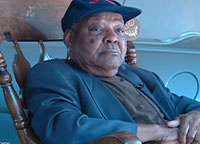One of 28 black soldiers wrongly convicted of WWII crimes in 1944 dies
Samuel Snow, one of 28 black soldiers who were wrongly convicted in a riot and lynching of an Italian World War II prisoner in Seattle in 1944, clung to life just long enough for his name to be cleared.

Snow, 83, died early Sunday at Virginia Mason Hospital, where he had been admitted because of an irregular heartbeat, Rep. Jim McDermott disclosed on behalf of Snow's family.
Snow came to Seattle on Friday to hear a formal apology from Ronald James, assistant secretary of the Army for manpower and reserve affairs, but was already in the hospital by the time of the ceremony Saturday afternoon at Discovery Park.
"We had not done right by these soldiers," James said. "The Army is genuinely sorry. I am genuinely sorry."
The soldiers' convictions were set aside, their dishonorable discharges were changed to honorable discharges and they and their survivors were awarded back pay for their time in the brig.
Ray Snow said he showed his father the honorable discharge plaque and read it to him in the hospital
"My dad has been standing in formation all these years waiting to have his name cleared," he said. "With the Army's honorable discharge, he was at ease. He now has his discharge papers and he went home."
McDermott pressed the Army to revisit the case largely because of the book "On American Soil" published in 2005 by Jack Hamann, a CNN and PBS journalist, and his wife Leslie about the riot on the night of Aug. 14, 1944, and subsequent events at Fort Lawton, a remnant of which remains within Discovery Park.
Dozens were injured in an uproar that started with a scuffle between an Italian prisoner of war and a black soldier from the segregated barracks near the POW housing. A POW, Guglielmo Olivotto, was found hanged at the bottom of a bluff the next day.
The Army prosecutor was Leon Jaworski, who went on to become special prosecutor in the Watergate scandal of the early 1970s.
Forty-three black soldiers were charged with rioting and three also were charged with murder. Two defense lawyers were assigned to the case and given two weeks to prepare without ever being shown an Army investigation criticizing the way the riot was handled.
Hamann wrote that at least two soldiers were threatened with lynching by Army detectives. When one witness said a "Booker T." was present at the riot but couldn't give any more detail, the Army charged two men by that name. Another was charged with rioting although white, black and Italian POW witnesses all said he tried to quell the disturbance
In the ensuing trial 28 men were convicted.
Photo: fairproxy.com
Subscribe to Pravda.Ru Telegram channel, Facebook, RSS!





